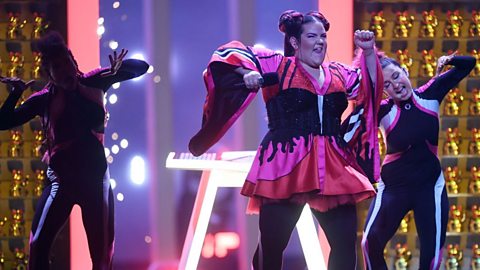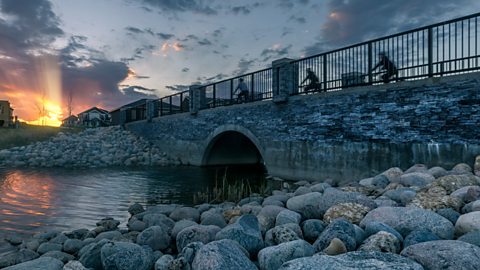When Jeangu Macrooy sings the Dutch entry on the Eurovision stage in Rotterdam this year, his song will include a linguistic first in the Contestтs 65-year history.
The anthemic Birth of a New Age features a section sung in the language Sranan Tongo. Itтs spoken by approximately half a million people in Suriname. Jeangu, who co-composed the song, included the phrase тYu no man broko mi/Mi na afu sensiт to mark his Surinamese roots. It translates as тYou canтt break me, Iтm half a centт and is inspired by a saying from his childhood. Jeangu moved from Suriname to the Netherlands when he was 20 to study and perform music.

Itтs not altogether unusual for a Eurovision song to celebrate the worldтs rich diversity of language. Since the competition began in 1956, there have been many examples of entries which highlighted languages the wider world may not be familiar with. These are just some of them.
Romansh (Switzerland 1989)
In 1988, an up-and-coming singer called Celine Dion brought Switzerland a last-minute Eurovision victory. Her song Ne Partez Pas Sans Moi (Donтt Leave Without Me) squeaked home by a single point over the UK entry Go, performed by Scott Fitzgerald.
That meant Celine got busy building a pop career, while Switzerland got busy hosting the show in Lausanne the following year. On home turf, the Swiss entry for 1989 was a treat for linguists everywhere - Furbazтs Viver Senza Tei (Living Without You) had lyrics in Romansh.
One of Switzerlandтs four official languages, it is spoken by just 0.5% of the population. It comes from the largest of the Switzerland is made up of 26 cantons which are grouped into seven geographical regions. , GraubУМnden, in the south-eastern corner of the landlocked country. Around 60,000 people speak Romansh today.
All Swiss entries prior to 1989 had been performed in the countryтs three other official languages of French, German and Italian, as well a solitary song in English when the rulebook allowed it in the mid 1970s.
On the night of the contest, Furbaz could not emulate Celineтs success. They finished 13th.
Breton (France 1996)
France has a good track record of being innovative with its language choices at Eurovision. In 1992, the Martinique-born singer Kali represented the country with Monte La Rivie, with lyrics in a mixture of French and his native Creole.
It isnтt the only time France has used a different language to French at Eurovision. In the 1996 Contest, staged in Oslo, the song Diwanit Bugale (May the Children Be Born) was performed in Breton, the language of Brittany. It was composed and performed by Breton-born artist Dan Ar Braz, who was joined onstage by some of the members of L'HУЉritage des Celtes, a large group of Celtic musicians he had performed with in concert. This led to the interesting combination of the Welsh singer Elaine Morgan and two members of the Scottish group Capercaillie - Karen Matheson and Donald Shaw - joining forces with Dan to perform the French entry.
This was a time when the Celtic sound was bringing Ireland great success at Eurovision (the Irish entry won the 1996 Contest), but the juries didnтt click with Diwanit Bugale in the same way. Breton had arrived at Eurovision, and went home with 18 points and 19th place.
Udmurt (Russia 2012)
One group which caught much attention in the run-up to the 2012 Contest held in Baku, Azerbaijan, were Buranovskiye Babushki, a group of six women from Buranavo in Udmurtia, a republic in the Russian Federation.
Popularly known as тthe Russian granniesт, the established folk group performed the song Party For Everybody, which began in traditional fashion before dropping into a disco beat. The songтs lyrics are a mixture of English and Udmurt.

Related to Finnish, Udmurt was on UNESCOтs 2011 list of endangered languages with around 460,000 speakers listed at that time. Group member Olga Tuktareva told the ТщЖЙЙйЭјЪзвГШыПк during the groupтs Eurovision rehearsals: тUdmurts are a tiny nation. And every small nation wants to be heard and seen. So it is a great opportunity to show this very small, very kind, very hard-working and patient people.т
On the night of the Eurovision final, Udmurt really did make an impact across the continent. The Babushki came in second to Swedenтs Loreen, and their performance - which included baking bread in a prop oven - is destined to feature in clip shows of Eurovisionтs most memorable moments for a long time yet.
Imaginary (Belgium 2003 and 2008)
In a 65-year history involving more than 1,500 songs, an array of languages have featured at the contest - even ones that donтt exist.
In 2003, Belgium came close to securing one of the most intriguing Eurovision victories ever with Sanomi, performed by the group Urban Trad. Just two points behind winners Turkey and one ahead of the Russian group tATu, the folk anthem was performed - Jabberwocky style - in an imaginary language, a first for the Contest.
Yves Barbieux, the composer of Sanomi, told Bitesize: тAs composer for a band that spoke many languages, I usually wrote fake lyrics to feel what language would be best - I even thought at a time to write in A language invented in the late 19th Century designed to be spoken by all people, all over the world, alongside their first language. .
тI was working on Sanomi when we got asked to represent Belgium. And we thought, why not represent Belgium with a language that was neither of our three official ones; French, Dutch and German. So I kept the imaginary language. That was a bit surreal, which was fine for us.т
Five years later, Belgium tried an imaginary language song again. The whimsical O Julissi was performed in a style reminiscent of light opera, but didnтt make the Saturday night final.
This article was published in May 2021.
When Eurovision and the real world collide
How politics has played its part in Europe's greatest show for more than 50 years.

The Eurovision geography quiz
How well do you know your Eurovision contestants from your continents?

Three surprising changes that transformed the English language
They say that change is the only constant in life - and that's certainly true for language too.
